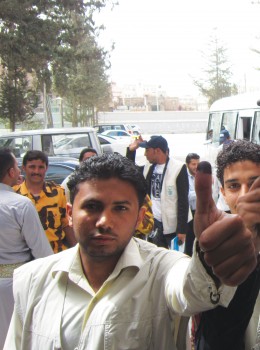
Si se necesita un momento catalítico para galvanizar a un gran número de personas, Yemen ha estado en medio de ese momento durante algún tiempo.. Aunque las cosas llegaron a un punto crítico, al menos en sentido figurado, en febrero cuando el país celebró sus elecciones presidenciales. A pesar de que sólo hay un candidato en la boleta, Los yemeníes acudieron a votar., palabras, 'por qué?'
Para jóvenes como Marwa, de veintiún años., no sólo era la primera vez en sus vidas que votaban, sino también que se les dio la oportunidad de participar en el proceso electoral real. Antes de las elecciones, el Proyecto de Medios de Vida Comunitarios financiado por USAID otorgó una subvención a la Fundación Holool, una organización yemení sin fines de lucro dedicada a combatir el desempleo y la pobreza, por entrenamiento 1,000 Los jóvenes se convertirán en monitores y observadores electorales.. Tener un propósito múltiple, El proyecto electoral proporcionó empleo a los jóvenes y al mismo tiempo los educó sobre los procesos electorales.. Otro objetivo del proyecto era llevar las voces y las ideas de los jóvenes yemeníes al discurso público, ya que son los principales actores de las políticas públicas..
“Cuando estaba en la mesa de votación, El periódico estaba frente a mí pero me quedé allí mirando [como si tratara de decidir por quién votar]. 'Estás bromeando?!' me dijo una chica que me estaba mirando, “¿Para qué sirven estas elecciones?? Sólo hay un candidato!'”, dijo Marwa., quien sirvió como monitor de las elecciones. “Le dije que lo sabía, pero aun así era importante porque al votar, Estamos mostrando a otros países que podemos seguir procesos democráticos y lo estamos haciendo para salvar a Yemen”.
durante las elecciones, Los jóvenes del proyecto alternaron entre ser supervisores u observadores electorales., para que puedan obtener el máximo beneficio de la experiencia.. También, otra novedad para Yemen, Se estableció un sistema de SMS para que el público pudiera informar sobre cualquier corrupción., fraude o violencia en las urnas. Los monitores juveniles revisaron los mensajes en pantallas con feeds grandes y los filtraron. Para mensajes de preocupación, Los observadores juveniles llamaron al centro electoral para que los observadores investigaran las acusaciones y tomaran medidas.. También se publicaron mensajes en un sitio web para que los votantes pudieran mantenerse actualizados sobre las elecciones en tiempo real..
Al principio, Pensé que nadie participaría y no entenderían. [cómo utilizar el servicio de SMS]. Me quedé impactado al ver al público participar.. Fue la primera vez en Yemen.. Me sentí orgulloso y hablé con mis amigos al respecto y me dijeron que nos dijeran cómo participar la próxima vez.," dijo Marwa. “En total recibimos 9,000 SMS. Incluso los EE.UU.. El embajador se sorprendió! Pensé que si recibimos tantos SMS cuando solo hay un candidato en las elecciones — entonces, ¿Qué pasaría si participara más de un candidato??!"